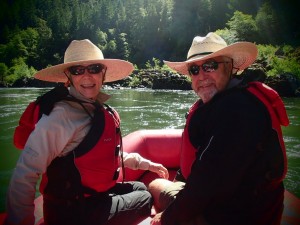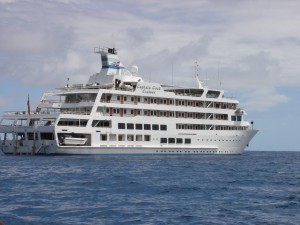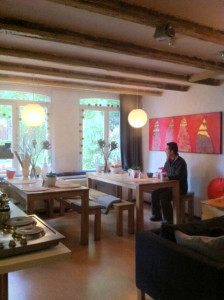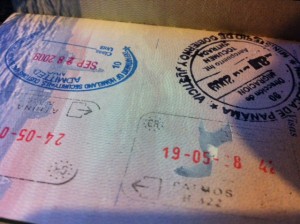baby boomer travelers
Happy World Tourism Week, everyone.
This is the annual week (September 21-28 in 2013) when the United Nations World Tourism Organization — which supports sustainable tourism around the globe — celebrates global tourism and tries to keep it on an environmentally friendly path.
This year’s theme is “Tourism and Water: Protecting Our Common Future” — a vital topic because if we don’t protect the earth’s oceans, rivers, lakes and wetlands, we’re all in deep trouble, not just the tourism industry.
But the name “World Tourism Week” got me to thinking about a debate that’s been brewing among travel bloggers and websites recently on the connotations of the word “tourist” and whether or not “tourists” are lesser forms of life compared to “travelers.”
The thinking goes like this: “Tourist” implies someone who takes group tours, maybe… Continue reading

Jacada Travel will help you get close up to a zebra on a luxury African safari.
I wasn’t too familiar with Jacada Travel, a London, England-based company that specializes in luxury private guided tours in Latin America and Africa, but a new Gold Award from Travel Weekly in their 2013 Magellan Awards made me take notice.
Jacada Travel was named a “Best Overall” tour operator by a panel of travel industry leaders and insiders.
The company is just five years old and promises to deliver personalized travel experiences, which they’ll design for you based on your wants, needs, desires, and, no doubt, a few whims.
If cost is no object — or at least not the defining object — in your pursuit of bucket list safaris in Africa or Amazon tribal encounters in Peru, Jacada Travel will make it happen.
Baby boomers (as well as other travelers such as… Continue reading
Decades ago, when baby boomers were in their 20s and backpacking around Europe, many discovered the joys of staying in youth hostels. The main joy is that they were cheap — really cheap — but they were also good places to meet like-minded travelers, pick up some budget travel tips from them, and maybe even make some new friends in a foreign city.
There were drawbacks: some hostels wouldn’t allow access to your room for several hours during the day; the rooms most often sported dormitory-like accommodations, complete with bunk beds for up to a dozen people, making privacy nonexistent; the bathrooms and showers were invariably down the hall (though so were those in inexpensive European hotels and pensions back in the day); cleanliness was often in short supply; and there was always the possibility of getting your possessions… Continue reading
Traditionally, some of the most painful experiences in traveling internationally have taken place before the trips even begin.
No, I’m not talking about buying the plane tickets, though that can be painful as well. I’m not even talking about packing your bags to satisfy TSA requirements.
I am talking about obtaining visas, especially for certain countries that seem to do everything they can think of to discourage visitors from actually coming and spending money within their borders — just about as short-sighted a policy as you can get, since tourism is now the world’s number one industry.
And yes, the U.S. is one of those countries. I wrote about Brazil sparring with the U.S. over mutually restrictive visa requirements in an earlier post.
But now, things are loosening up a bit, according to a report… Continue reading

Baby boomers are filling their bucket lists — and spending money doing it. Photo from ROW Adventures
I came upon this observation from an unnamed pharmaceutical industry consultant, so I can’t give proper credit (though it appeared in the always provocative Bo Sacks media newsletter):
“No form of advertising is a safe, perpetual source of revenue, no matter how flush the advertiser or how desirable the audience. Because advertising has to change behavior, not just look good or get attention.”
His or her immediate point was that pharmaceutical ads aimed at doctors usually try to convince the physicians to change drug brands rather than cement a brand they currently prescribe to their patients — because for various reasons that’s where the potential profits lie — and I’m sure it’s an accurate observation…in many cases.
But it struck me as not necessarily true about travel advertising — … Continue reading
The Carnival Freedom will carry baby boomer singles to the eastern Caribbean in November 2013. Photo from Carnival.
Here’s a niche within a niche: a cruise not just for baby boomers, but for single baby boomers.
It makes sense, because while lots of cruises are filled with boomers, cruises — ever popular with couples, families and even groups of friends — can be difficult for single travelers.
Where does a single traveler sit at dinner? Where does a single traveler find a dance partner? Where does a single traveler find someone to just hang out with?
The problem may even be greater for travelers over 50.
To meet this need, Singles Cruise is sponsoring an eight-night “Baby Boomers Caribbean Adventure Singles Cruise” for singles born between 1946 and 1964, embarking November 16 from Ft. Lauderdale, Florida, aboard the Carnival Freedom.
The eastern Caribbean cruise will call at the islands of… Continue reading
In a previous post I wrote about “gramping” — grandparents camping with grandkids (but cheating a bit by bedding down in a lodge) — a name coined by an inn in Ohio.
A king-sized bed lures baby boomers in one of the “glamping” tents at the River Dance Lodge. Photo from River Dance Lodge.
Now comes “glamping” — a term that’s catching on as a clever contraction for “glamorous camping,” a combo that doesn’t always spring immediately to mind.
Glamping seems tailor-made for baby boomers, who may love the great outdoors but also tend to favor somewhat softer accommodations than, well, hard ground dotted with annoying pebbles.
Glamping, however, involves (at a minimum) tents with real beds inside — what’s not to like?
“Glamping” has been around for a while, though perhaps not by that name. The English used to go on African safaris in tents that… Continue reading
Starwood Hotels CEO Frits van Paasschen.
Starwood Hotels and Resorts CEO Frits van Paasschen, regarded as a visionary in the industry, has a fascinating take on what travelers will soon expect from their chosen lodgings (as recounted in this piece by Greg Oates in Skift.com).
“Today,” he recently told the hotel group’s annual sales pow wow in New Orleans, “a hotel brand can’t stand apart just by having a comfortable, reliable, clean room…that expectation today, driven by technology, is personalization.”
Van Paasschen gives the examples of Amazon.com and Facebook, who not only seem to know everything about their customers and users, they do know what their customers and users are looking for and like. (After all, we give them the information, and they know how to mine the data.)
“So how long will it be,” he asks, “before all of us expect a hotel brand where we spend… Continue reading

Jester the Weimaraner puppy and Instagram marketer overlooks the Queensland coast. Photo from Brisbane Times
From time to time I like to call attention to tourism bureaus and marketers using creative visuals to reach potential visitors.
A recent example is Bushmills in Northern Ireland painting faux people and animals on abandoned houses and shops to make it appear the town is more prosperous than it actually is. And with tourism increasing, it seems to be working.
Now Tourism Queensland (Australia) is using a six-month-old Weimaraner puppy named Jester to spearhead a new Instagram campaign intended to depict what life is like for typical Queenslanders.
Queensland residents are encouraged to send in their photos for Jester to post on Instagram between September 9 and 15. (Lacking opposable thumbs, Jester will be aided in this endeavor by regional photographer and a park ranger, but he will apparently be barking out his… Continue reading

If Niagara Falls is on your “bucket list,” Expedia may get you there. Photo from Niagara Falls State Park.
You may have seen the Expedia.com TV commercial in which a man stops random passersby, questions them about their dream trips and inquires, “If you were asked to drop everything right now, would you go?” and suggests that Expedia is ready to buy them a ticket and send them wherever they want — if they go now.
The ad is titled “Find Your Spontaneity,” a teaser for Expedia’s current “Trip A Day Giveaway” promotion.
Some say no, they just couldn’t do it today. But one man, whose dream is going to China, does agree to leave that night — and the next image we see is him standing on the Great Wall, not quite believing his good fortune.
The first thing that bothered me about this ad is that unless… Continue reading













